- Home
- Jodi Picoult
Leaving Home: Short Pieces Page 3
Leaving Home: Short Pieces Read online
Page 3
So although I am thinking it, you won't hear me tell you: Do what you love. Have you ever heard a five-year-old say that when he grows up, he wants to be an advertising executive? I didn't think so. A crazy thing happens at university - kids who once wanted to be astronauts and ballerinas and firemen somehow morph into bankers and public relations specialists and sales managers. Practicality - such as paying the bills for the first time in your life - is a heavy-duty abrasive that wears the sharp edges of a dream to fit into the round hole of reality. Remember me - with my one-in-a-million career path - the writer I hoped to be, instead of the teacher I assumed I'd be. Don't listen to people who ask you what on earth one does with a degree in Egyptology. If it's what you fall asleep thinking about, and wake up excited about, it's what you should pursue. The rest (including a paycheck) will somehow sort itself out.
You won't hear me tell you: See the world through your own eyes. When you were ten, you stood up in class and blurted out, I love math! It was an outburst of sheer enthusiasm, followed by a chorus of snickers from the rest of the class. I remember cringing, because I knew how much you'd be teased. But you know what? You did love math. You still do. And you knew even at that age that your voice had just as much right to be heard as anyone else's. That's still true - whether you are talking about religion, politics, or sexual orientation. You're smarter than I ever was. You're self-motivated. You have the persuasive ability to talk a polar bear into moving to the Bahamas. Sure, it's easier to be a lemming, to agree with what the majority says and does. But it's more meaningful to be the dissenting vote, because - who knows? - you just might make someone else think twice.
And, a codicil: This planet is smaller than you think. I don't just mean that environmentally - an arena where you've taught me, instead of the other way around. I mean that there will be plenty of people who do not think the way you do - whether that's in a class at college, in the workplace, in your country. Don't judge someone just because their opinions are different - lest they do the same to you. Instead, ask them if they want to grab a cup of coffee. Start a conversation. Listen. Open their minds - and your own. Focus on what's good, instead of carping about what's lousy. Is your waitress particularly attentive? Tell her how much you appreciate it. Write a letter to the editor of the local paper, praising someone who's done a great job. For some reason, discontent spreads virally, and edges out kindness. Make some room for it.
Expect to cry. Real life isn't fair. People get promoted who don't deserve it. Politicians get elected when they're not the wisest choice. You finally get the courage to ask someone out - and you get rejected. Baseball players make millions and teachers can barely pay their mortgages. Here's a bona fide fact: You're not going to get straight A's in college; you're going to have professors who play favorites. So be it. One of the best lessons you'll ever learn is how to pick yourself up again, and in order to do that, you have to stumble.
Fall in love. Once, you and I had a conversation about whether or not love was a miracle. You said no - that there are natural phenomena that can't always be explained by science. I said yes - that in a world of six billion people, finding someone who gets you is pretty miraculous. I hope I get to prove you wrong. I hope you find a partner who makes you a better version of yourself, simply by association. I hope you find a person who loves you not because you're perfect, but in spite of the fact that you're not.
There are so many other things I won't say to you: Be history, instead of just watching it happen from the sidelines. Try something new, even if it scares you to death. Learn because you love to learn, not because you're being tested. Don't whine - there is always someone who's having a worse day than you are. Be honest with yourself, and you'll never have anything to hide. But all of these things you will discover, in due course.
Growing up isn't about age, and it isn't about experience. It's a very real threshold, much like the one we're standing on now at your dorm room, between two schools of thought. One minute, it's all about you - and the next, it's all about the people that surround you. As soon as their well-being is more important to you than your own, you have crossed that threshold; you can call yourself an adult.
I have always loved you, but I can very distinctly remember the moment I realized how much I liked you as well - not just as my child, but also as a fellow human; as someone I would pick as a friend, even if you had not been placed strategically in my life's path. I was on a book tour in Rome and I had brought you along. After an hour of walking in circles, due to my geographical incompetence, you ripped the little map out of my hands. You, you said firmly, are not allowed to use this anymore. And just like that, you became the grownup, and I followed you like a child to our destination.
It was not the first time we had been on an unknown road together. Eighteen years ago, you were the one who showed me how to be a mother - a baptism by fire. You loved me, even during the times I wasn't sure I was doing it right or well, simply because I was yours. During that hurricane in 1991, when I held you for the very first time, I could never have imagined that this is where we would both end up.
Now, as you bend down to embrace me, as you say goodbye, I think of all the things I've taken for granted: The ability to hug you whenever I feel like it. The pitch of your voice. The mess on the floor of your room. A standing invitation in front of the television, to watch a new episode of Project Runway. Your incredible photographic memory. The seat height in your car, which I always have to readjust. Your sarcasm. The beauty of you doing a one-and-a-half off the diving board. The way you roll your eyes, but ultimately share your chocolate with me.
So, here is my brave smile, the one that will crumble as soon as I am safely in the car, where you can no longer see me.
Work hard! Have fun!
And maybe there is one last thing I will say: Eighteen years ago, when I saw you for the first time, I was wrong. The story you'll tell the world, Kyle, is not the one about how you arrived...but instead the one about where you are headed.
I can't wait to hear every word.
Ritz
The note is inside the refrigerator, propped against a carton of orange juice. I'm taking a break, my mother has written. Don't worry about me.
"What's she taking a break from?" I ask out loud.
"Sanity," my brother Devon answers. "People don't leave notes in refrigerators."
Devon, who is eighteen and apparently knows everything, is looking at this the wrong way, in my opinion. Granted, I'm three years younger than he is, but I think Mom has shown a peculiar genius in leaving the note between the leftovers from yesterday's lasagna and the bottle of canola oil: she knew that a message on the kitchen counter could easily be overlooked; but no matter what direction we were pulled in after school; no matter how much French verb conjugation I had to slog through or how many hours Devon spent making a racket with his garage band -- eventually, we will give into our growling hunger and find something to eat.
"Maybe we should call Dad," I suggest.
Pretty much, a bomb would have to detonate inside our living room to warrant a phone call to my father during business hours. He works on Wall Street, trading futures.
He leaves at 4:30 AM to beat the traffic going into the city from White Plains, and he gets home after seven. The irony doesn't escape me: he is so busy tracking what might happen that he's hardly around to enjoy the here and now.
Devon shrugs. "She probably went out to...do whatever she does. You know."
But the truth is, I have no idea what my mother does with her spare time. I mean, I guess maybe she likes to jog every now and then, or hit a good sale at a mall. I think sometimes she goes out and has lunch with one of her friends. But mostly, my vision of her is firmly planted in our house, like a vine too twined to be transplanted. Just like I used to believe that my kindergarten teacher slept underneath her desk, it is hard to picture my mother existing outside the boundaries of my home, of my life.
"She'll be back in time to make dinner," Devon says,
and then he reaches out and messes up my hair. It is totally out of character for him - Devon is more likely to accidentally drop my toothbrush in the toilet than show me any sisterly affection - and somehow this compassion makes me feel worse, as if he is being nice to me in the way that people are nice to cancer patients or mentally challenged kids or anyone else who's had such bad luck that you want to compensate with kindness. I go soft inside, like the egg that my mother cooks for us when we are sick. She serves it in a little half-cup with a daisy painted on the side. I always wondered what would happen if Devon and I both got sick at once; since there is only one egg cup.
I realize, with a little shiver, that I have never seen my mother sick. I mean, sure, she gets colds and allergies, but how can someone survive over a decade without being so sick she just crawls into bed and has someone else wait on her hand and foot? Then again, who would fill that role for my mother? I consider what it might be like to feel lousy, but have to cook yourself your own egg and put it in the daisy cup.
And that's how I realize my mother will not be home for dinner, for breakfast, maybe not forever.
Just so you know, I'm not stupid. I may only be in ninth grade but I get straight A's; I score off the charts on the standardized tests we have to take at school. In this, I am the polar opposite of my brother, for whom school is not a journey, but a condition you outgrow.
I am, however, invisible. Devon's surly enough to take up all the parenting time allotted to both of us. I hardly ever talk to my father, because he's so busy that it seems ridiculous to think he'd care about what grade I got on my science project. And my mother's usually running in a thousand directions at once. I'll listen in a minute, she says, but then she never quite gets around to it.
A little while after we find the note, I track Devon down in the garage, wailing on his bass while two of his friends play the drums and the guitar. This week they are calling themselves Goths in Thongs. Last week, it was the Undead Puppies.
Devon sees me and stops playing. "What," he says, an accusation.
"She's still not back."
He rolls his eyes. "Jenna, it's only been an hour."
I cross my arms. "I called her cell phone and she didn't answer."
"So what? Maybe she turned it off. Maybe she's at a movie."
"Dude," says Yak, who plays the drums. That's not his real name, by the way. I think it's Absalom or Alistair or something like that. "Is there a problem?"
"Our mother's gone missing."
"Sweet," Yak says. "Could she take mine with her?"
I leave them alone in the garage and sit on the edge of the porch. There are flowers all along the edge of it - a net of purple and cobalt; a startling orange tiger lily, its open mouth raw and pink.
The portable phone I'm holding (just in case) rings, startling me. "Hi," I say breathlessly, but it is only my father. He calls every day from the station, to let my mother know which train he's catching. I think it's less about her peace of mind and more about making sure his dinner is hot when he gets home.
"Pumpkin," he says. "Mom around?"
"No," I tell him. "She left us a note -"
"Well, tell her I caught the 5:58," he says.
"Look, Dad -"
"Gotta run, honey, if I want to make this train..."
He hangs up, and I let the phone fall into my lap, where it rings again almost immediately. "Dad?" I say, picking it up.
"No," my mother answers, "it's me."
"Mom? Where are you?"
In the silence, I can hear other people talking - loudspeakers, announcements I can't quite make out. "Jenna, listen, there's meatloaf for supper," she says. "It's in the tinfoil on the second shelf of the fridge. You can open up a bag of salad, too."
"You mean you won't be here for dinner?"
"Did you talk to your father?" she asks.
"He said he's catching the 5:58." My throat closes like a fist. "Mom, what's going on?"
For a moment, she's quiet. Then she says, "I'll call you when I get there."
"Get where?" I demand, but an electric eel of static crackles in my ear.
"Jenna," my mother says. "I'm losing you." And as the line goes dead I think, No, it's the other way around.
#
By nine o'clock at night, we are all sitting at the kitchen table, waiting for the phone to ring. My father is still wearing his dress shirt, but it's creased like a map and the sleeves are rolled up past his elbows. In front of him is the bowl of Life cereal he didn't really eat for dinner, solidifying into cement. "Jenna," he says, for the bazillionth time, "you have to remember something."
It figures, the one time anyone wants to listen to me, I can't remember anything important. I have already told them everything Mom said; the problem is, we really need to know what she didn't.
"Could it have been an airport?" Devon asks. "Is that what the announcements sounded like?"
"I don't know."
My father has already called the police, but they told him that you can't file a missing persons report for twenty-four hours. And besides, it's not really a missing person if the person herself chose to go missing. That, the sergeant said, is just bad luck.
He scrubs his hands over his face. "Okay," he says, as if telling himself this might make it come true.
I have been tugging at a thread on the placemat in front of me. "Do you think it's something we did?" I ask, my voice so tiny that it rolls like a pebble to the center of the table.
At first, I assume that nobody's heard me, or that they've ignored me, which is par for the course. But then Devon looks up. "I forgot to fold my wash. She asked me, like, ten times, but I never got around to it. And I kind of didn't take out the trash either."
His face pinkens. "It was pouring, and I knew she'd do it if I didn't, anyway."
"I told her it was practically child abuse to make me take the late bus home after soccer practice, when she was just sitting here anyway and could come pick me up," I admit. "And remember when you wouldn't stop playing your stupid guitar and she was trying to balance the checkbook?"
"Maybe it wasn't just us," Devon says, and he turns to my father. "Did you guys have a fight?"
My father scowls. "Of course not. We barely had time to talk last week, much less fight. I was busy working on that Hashomoto deal."
I rub a crease into the placement with my thumb. "Maybe it's not something we did. Maybe it's something we didn't."
The phone rings, and my dad answers it on speaker phone so that we all can hear.
"Ian," my mother says. "Hi."
Although we've all talked about how we're going to tiptoe around conversation when the moment actually arrives, my father completely blows it. "Charlotte, where the hell are you?"
"San Francisco!" I can hear the smile in her voice, bright as gold. "Can you believe it?"
"Mom?" Devon interrupts. "Is this because of my laundry?"
My brother can be such an idiot. "Mom," I pipe in, only because I want her to know I'm here, too, listening. "Is the weather nice out there?"
My father and Devon look at me like I'm crazy. "Charlotte," my father says evenly. "You've made your point. You can come back now."
"I'm not making a point, Ian. I'm just...taking a vacation."
A vacation. My mother is taking a vacation. From all of us.
"I don't understand," my father says.
"Well, you should," my mother replies. "I'm doing what you do, every day: trading futures." As soon as she hangs up, Devon dials *69.
"Good evening, the Ritz-Carlton," a honeyed voice says. "How may I direct your call?"
My father pushes a button, disconnects us. "Mom's staying at the Ritz-Carlton?" I ask.
"You could cut off her credit cards," Devon suggests. "I saw that on Law & Order, once."
"I'm not cutting off your mother's credit cards," my father replies. "This is just her way of going on strike."
"Maybe we should cross the picket line, then," Devon suggests.
"We," m
y father announces, "will hardly even notice she's gone."
#
That night, we make a plan. I will be in charge of dishwashing; Devon - in spite of his lousy track record - will do the laundry. Dad will take over vacuuming and mopping of all floors. When we go to bed, the house is sparkling, perfect. Mom will come home, I think, and will be absolutely stunned.
Assuming we can keep it up.
My father comes in to tuck me in, even though he usually doesn't do that anymore. He sits down on the edge of my bed. "Dad," I ask. "What do you do, for real?"
"I'm a trader, honey. You know that."
"Yeah, but what do you do?"
"Say I want to buy oil for the house for next winter. I can commit now to buy it at a certain price arranged by the oil company. But maybe I have a different view about what the price of oil is going to be. Maybe I think that war will break out again, and the price of oil will rise. Maybe I think that after the election, the price will drop. My job's about hunches...if I think the price will be lower in the future, I can agree to sell oil a year from now that I don't own yet. If I'm right, I can buy that oil in the future and immediately resell it to the company I contracted with and make a profit. Of course, if the price of oil actually goes higher, I lose big time. Basically, I'm betting on the future. And I can bet it's going to get better, or I can bet it's going to get worse."

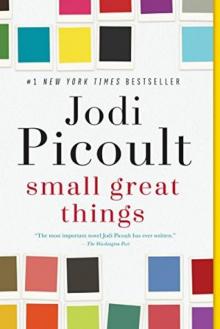 Small Great Things
Small Great Things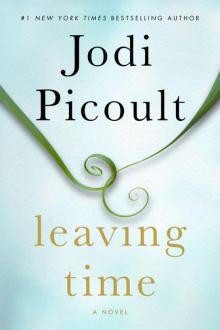 Leaving Time
Leaving Time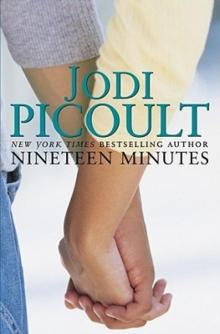 Nineteen Minutes
Nineteen Minutes Larger Than Life
Larger Than Life Perfect Match
Perfect Match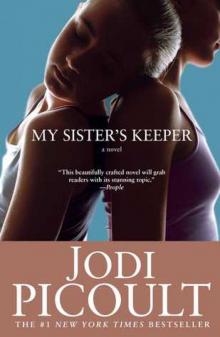 My Sister's Keeper
My Sister's Keeper The Pact
The Pact Handle With Care
Handle With Care Songs of the Humpback Whale
Songs of the Humpback Whale Mermaid
Mermaid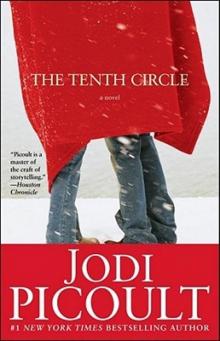 The Tenth Circle
The Tenth Circle The Color War
The Color War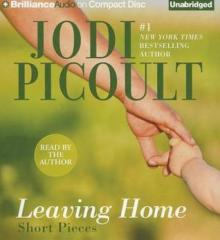 Leaving Home: Short Pieces
Leaving Home: Short Pieces House Rules
House Rules Lone Wolf
Lone Wolf The Storyteller
The Storyteller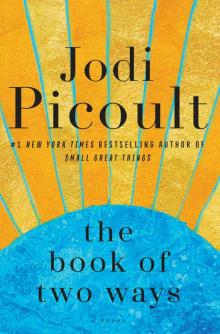 The Book of Two Ways
The Book of Two Ways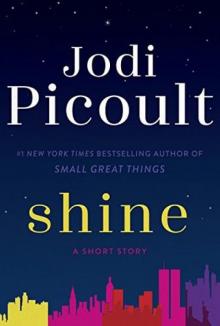 Shine
Shine Off the Page
Off the Page Sing You Home
Sing You Home Second Glance: A Novel
Second Glance: A Novel Mercy
Mercy Vanishing Acts
Vanishing Acts Between the Lines
Between the Lines Plain Truth
Plain Truth Salem Falls
Salem Falls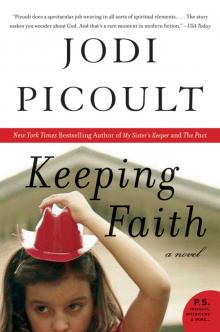 Keeping Faith
Keeping Faith Harvesting the Heart
Harvesting the Heart Change of Heart
Change of Heart Where There's Smoke
Where There's Smoke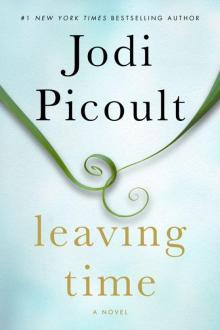 Leaving Time: A Novel
Leaving Time: A Novel Over the Moon
Over the Moon House Rules: A Novel
House Rules: A Novel The Jodi Picoult Collection #2
The Jodi Picoult Collection #2 Leaving Home: Short Pieces (Kindle Single)
Leaving Home: Short Pieces (Kindle Single) My Sister's Keeper: A Novel
My Sister's Keeper: A Novel![Mermaid [Kindle in Motion] (Kindle Single) Read online](http://i1.bookreadfree.com/i1/04/03/mermaid_kindle_in_motion_kindle_single_preview.jpg) Mermaid [Kindle in Motion] (Kindle Single)
Mermaid [Kindle in Motion] (Kindle Single) The Jodi Picoult Collection #4
The Jodi Picoult Collection #4 Sing You Home: A Novel
Sing You Home: A Novel The Jodi Picoult Collection
The Jodi Picoult Collection Lone Wolf A Novel
Lone Wolf A Novel Second Glance
Second Glance Larger Than Life (Novella)
Larger Than Life (Novella) The Jodi Picoult Collection #3
The Jodi Picoult Collection #3